Unit1 The king's new clothes第一课时 课件(共28张PPT)
文档属性
| 名称 | Unit1 The king's new clothes第一课时 课件(共28张PPT) |
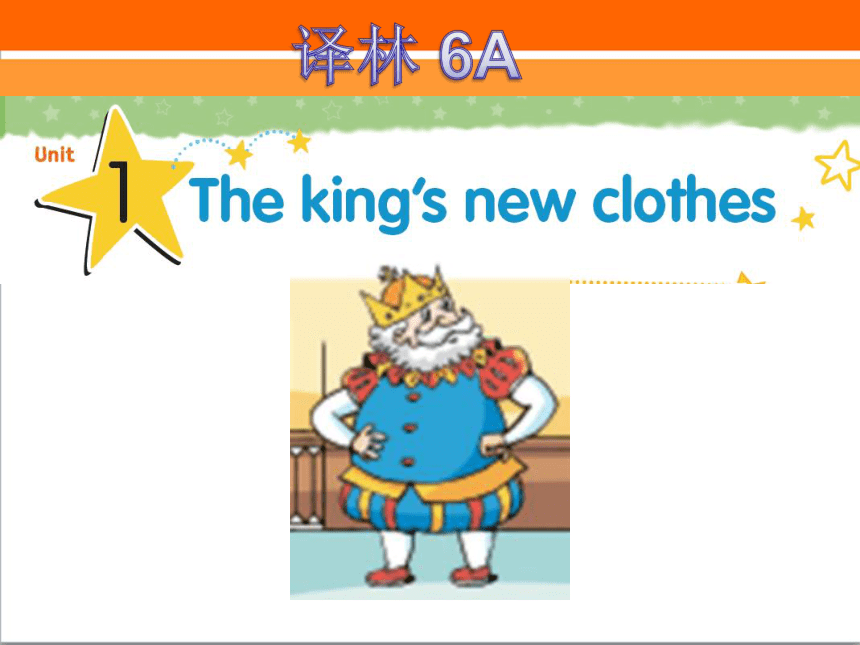
|
|
| 格式 | ppt | ||
| 文件大小 | 1.9MB | ||
| 资源类型 | 教案 | ||
| 版本资源 | 牛津译林版 | ||
| 科目 | 英语 | ||
| 更新时间 | 2020-09-20 21:28:31 | ||
图片预览



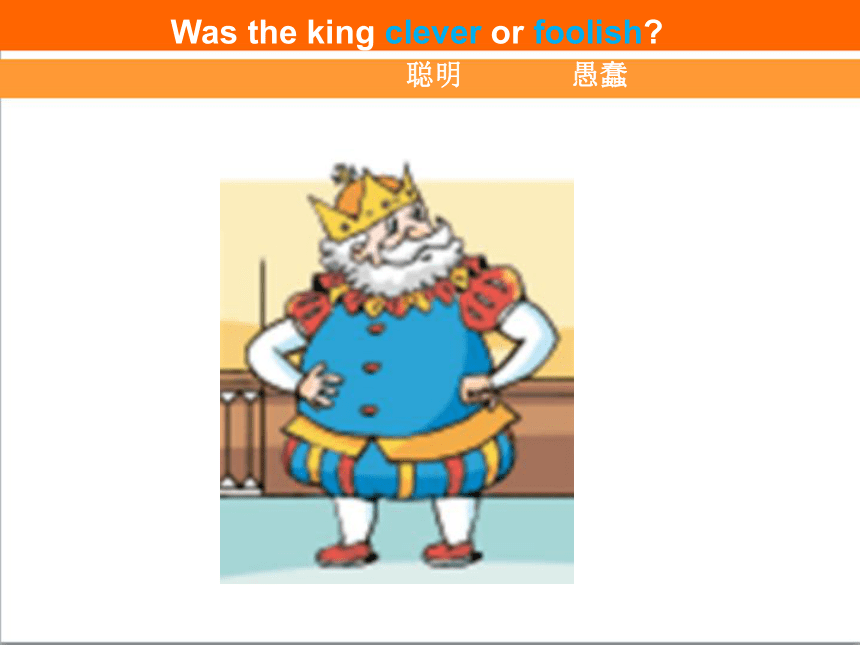
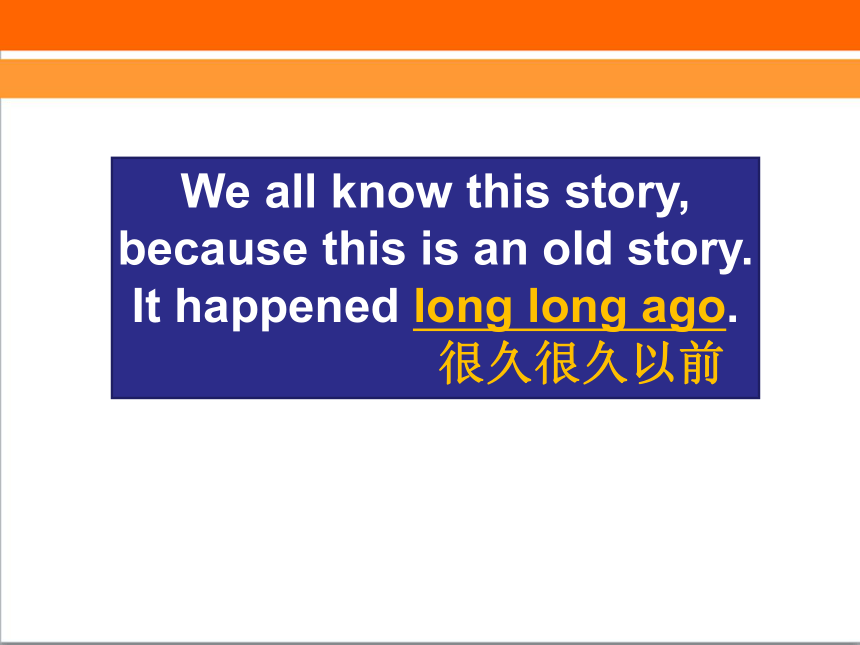
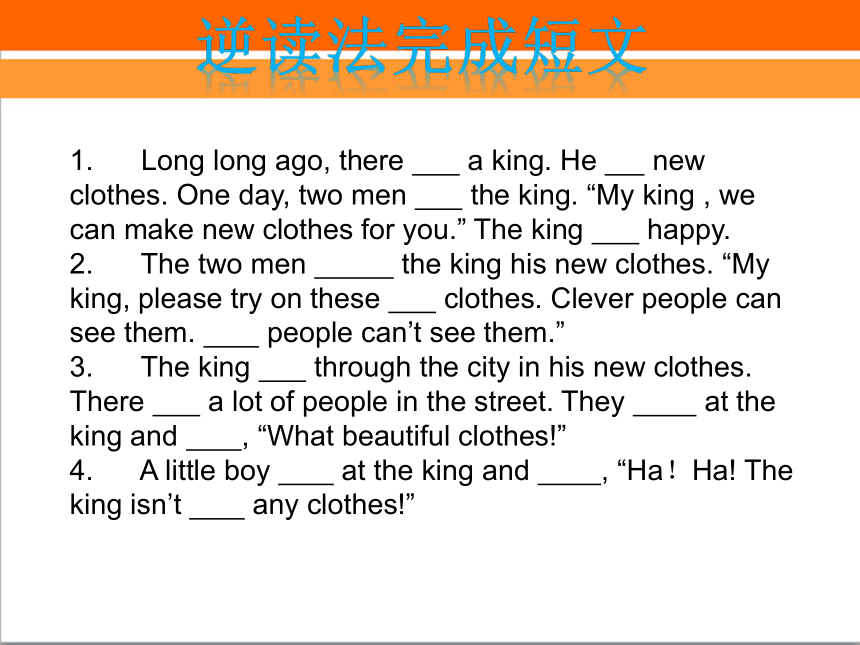
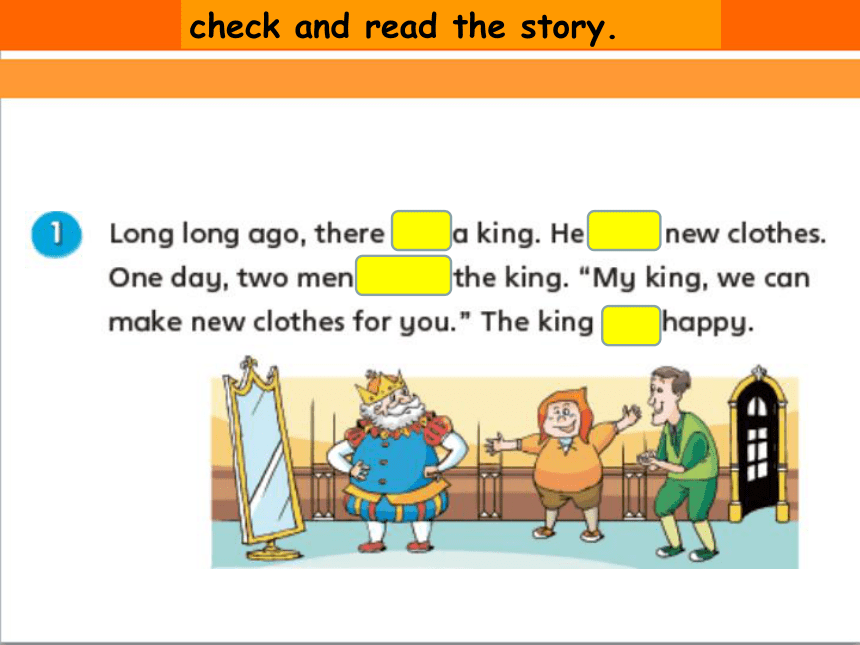
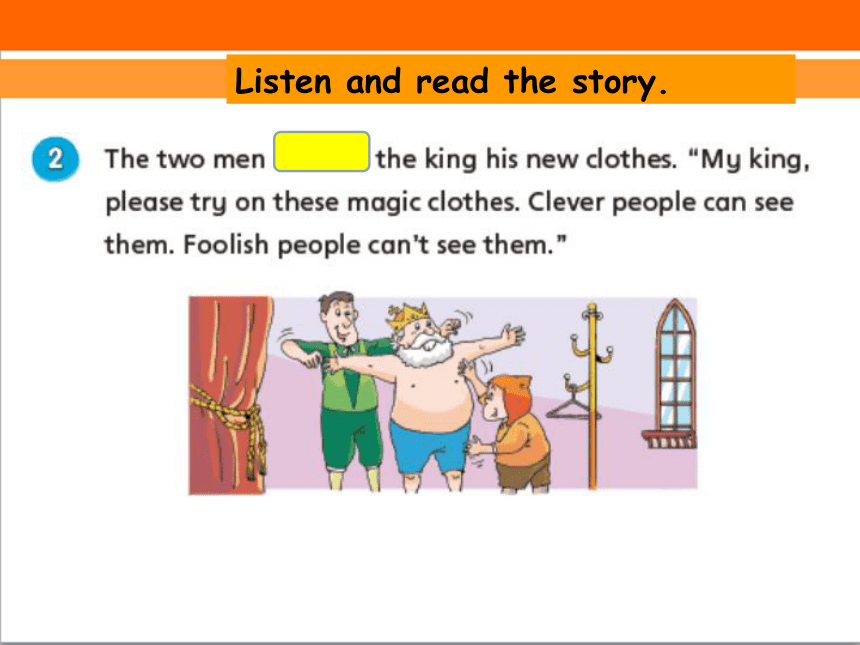
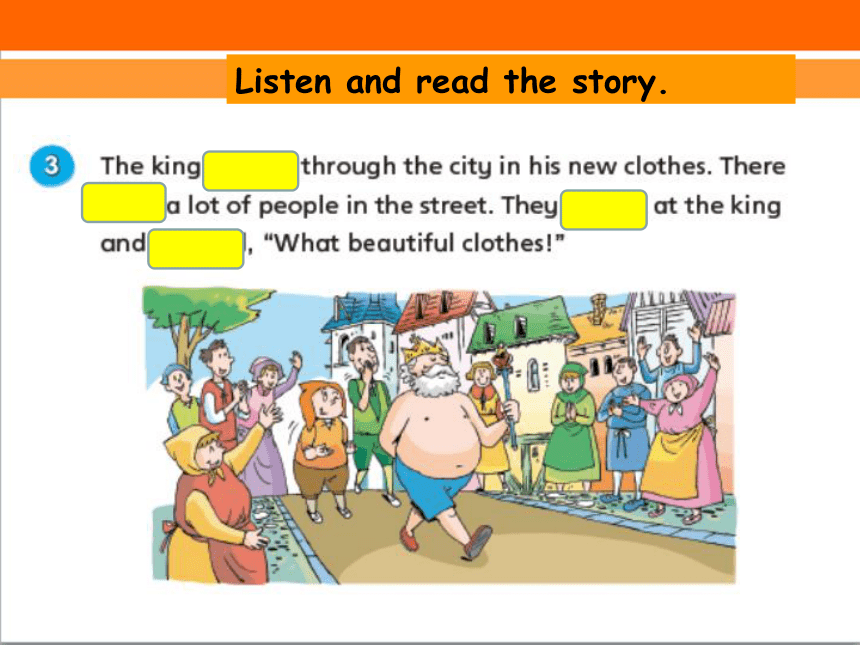
文档简介
What day is it today?
What date is it?
How’s the weather today?
What are you wearing today?
I like wearing new and pretty clothes.
What about you?
Now I’ll show you a story about a king who liked new clothes very much.
Was the king clever or foolish?
聪明
愚蠢
We all know this story, because this is an old story.
It happened long long ago.
很久很久以前
1. Long long ago, there a king. He new clothes. One day, two men the king. “My king , we can make new clothes for you.” The king happy.
2. The two men the king his new clothes. “My king, please try on these clothes. Clever people can see them. people can’t see them.”
3. The king through the city in his new clothes. There a lot of people in the street. They at the king and , “What beautiful clothes!”
4. A little boy at the king and , “Ha!Ha! The king isn’t any clothes!”
check and read the story.
Listen and read the story.
Listen and read the story.
Listen and read the story.
like - liked
visit-visited
show - showed
walk - walked
look - looked
shout - shouted
point - pointed
laugh - laughed
两个特殊的
is - was
are - were
Some words are very special. Did you find them?
说出文中的规则动词过去式
一般过去时:表示过去的某个时间发生的动作或存在的状态,一般情况下,在动词后加ed来表示。
like - liked
visit-visited
show - showed
walk - walked
look - looked
shout - shouted
point - pointed
laugh - laughed
两个特殊的
is - was
are - were
1、ed发/t/ 如: liked walked looked laughed
2、ed发/d/ 如: showed
3、ed发/Id/ 如: visited shouted pointed
( ) What did the king like?
A. Beautiful clothes. B. New clothes.
2. ( )Who visited the king?
A.Two men. B. Two women.
3. Clever people ( ) see the clothes.
Foolish people ( ) see them.
A. can’t B. Can
4.The king walked through the ( ) .
A. town B. City
5. ( ) pointed at the king and laughed.
A. A man B. A little boy
Try to read after the teacher.
The king liked new clothes. ______
Two men showed the king some magic clothes. ______
The king was foolish. ______
People could see the king’s new clothes. ______
The boy was foolish because he could not see the king’s new clothes. ______
Read together
一般直接在词尾加“ed”。
如:plant-planted visit -visited
以不发音字母“e”结尾,直接加“d”。
如:like -liked
以辅音字母加“y”结尾,需变“y”为“i”再加“ed”。
如:try -tried
有些动词要双写最后一个字母,再加“ed”。
如:stop -stopped
?
一般过去时(行为动词型):表示过去某一时间发生的动作
(一)动词过去式的规则变化:
1.清辅音结尾的动词+ed, 发/t/
cooked coughed danced helped hoped jumped laughed liked looked parked stopped surfed talked thanked touched walked washed watched worked asked
?
2.浊辅音和元音结尾的动词+ed, 发/d/
浊called cleaned climbed closed jogged joined lived loved moved opened used
元 carried cried followed glowed played showed stayed studied tried watered
?
3.以字母t或d结尾的动词+ed, 发/id/
collected needed skated started visited wanted pointed shouted
?
(二) 规则动词的词尾读音:
1. is, was, were, lived, live
Long long ago, there a mountain(山). There a house on the mountain. An old man and a little boy in the house. The old man told(tell的过去式) the boy a story.
2. picked, lived, were, was, give, shouted , walked
Long long ago,there __________ a lion. He __________ in the forest(森林). There __________ some flowers in front of the lion’s house. One day, an old man __________ by the house. He __________ a flower. The lion angry. He __________ at the old man,“You picked a flower. Now __________ me your child.” The old man’s child was a beautiful girl. She __________ with the lion. The lion nice to her. One day, the lion __________ sick. The girl looked after him. Then the lion turned into a prince(王子).
1
2
3
4
/t/ /d/ /id/
watched watered visited
picked stayed collected
milked played needed
Read and think:
Find friends:
/t/ /d/ /Id/
catched
passed
asked
played
listened
collected
pulled
watered
needed
jumped
catched watered passed listened needed
asked played jumped pulled collected visited
visited
What date is it?
How’s the weather today?
What are you wearing today?
I like wearing new and pretty clothes.
What about you?
Now I’ll show you a story about a king who liked new clothes very much.
Was the king clever or foolish?
聪明
愚蠢
We all know this story, because this is an old story.
It happened long long ago.
很久很久以前
1. Long long ago, there a king. He new clothes. One day, two men the king. “My king , we can make new clothes for you.” The king happy.
2. The two men the king his new clothes. “My king, please try on these clothes. Clever people can see them. people can’t see them.”
3. The king through the city in his new clothes. There a lot of people in the street. They at the king and , “What beautiful clothes!”
4. A little boy at the king and , “Ha!Ha! The king isn’t any clothes!”
check and read the story.
Listen and read the story.
Listen and read the story.
Listen and read the story.
like - liked
visit-visited
show - showed
walk - walked
look - looked
shout - shouted
point - pointed
laugh - laughed
两个特殊的
is - was
are - were
Some words are very special. Did you find them?
说出文中的规则动词过去式
一般过去时:表示过去的某个时间发生的动作或存在的状态,一般情况下,在动词后加ed来表示。
like - liked
visit-visited
show - showed
walk - walked
look - looked
shout - shouted
point - pointed
laugh - laughed
两个特殊的
is - was
are - were
1、ed发/t/ 如: liked walked looked laughed
2、ed发/d/ 如: showed
3、ed发/Id/ 如: visited shouted pointed
( ) What did the king like?
A. Beautiful clothes. B. New clothes.
2. ( )Who visited the king?
A.Two men. B. Two women.
3. Clever people ( ) see the clothes.
Foolish people ( ) see them.
A. can’t B. Can
4.The king walked through the ( ) .
A. town B. City
5. ( ) pointed at the king and laughed.
A. A man B. A little boy
Try to read after the teacher.
The king liked new clothes. ______
Two men showed the king some magic clothes. ______
The king was foolish. ______
People could see the king’s new clothes. ______
The boy was foolish because he could not see the king’s new clothes. ______
Read together
一般直接在词尾加“ed”。
如:plant-planted visit -visited
以不发音字母“e”结尾,直接加“d”。
如:like -liked
以辅音字母加“y”结尾,需变“y”为“i”再加“ed”。
如:try -tried
有些动词要双写最后一个字母,再加“ed”。
如:stop -stopped
?
一般过去时(行为动词型):表示过去某一时间发生的动作
(一)动词过去式的规则变化:
1.清辅音结尾的动词+ed, 发/t/
cooked coughed danced helped hoped jumped laughed liked looked parked stopped surfed talked thanked touched walked washed watched worked asked
?
2.浊辅音和元音结尾的动词+ed, 发/d/
浊called cleaned climbed closed jogged joined lived loved moved opened used
元 carried cried followed glowed played showed stayed studied tried watered
?
3.以字母t或d结尾的动词+ed, 发/id/
collected needed skated started visited wanted pointed shouted
?
(二) 规则动词的词尾读音:
1. is, was, were, lived, live
Long long ago, there a mountain(山). There a house on the mountain. An old man and a little boy in the house. The old man told(tell的过去式) the boy a story.
2. picked, lived, were, was, give, shouted , walked
Long long ago,there __________ a lion. He __________ in the forest(森林). There __________ some flowers in front of the lion’s house. One day, an old man __________ by the house. He __________ a flower. The lion angry. He __________ at the old man,“You picked a flower. Now __________ me your child.” The old man’s child was a beautiful girl. She __________ with the lion. The lion nice to her. One day, the lion __________ sick. The girl looked after him. Then the lion turned into a prince(王子).
1
2
3
4
/t/ /d/ /id/
watched watered visited
picked stayed collected
milked played needed
Read and think:
Find friends:
/t/ /d/ /Id/
catched
passed
asked
played
listened
collected
pulled
watered
needed
jumped
catched watered passed listened needed
asked played jumped pulled collected visited
visited
